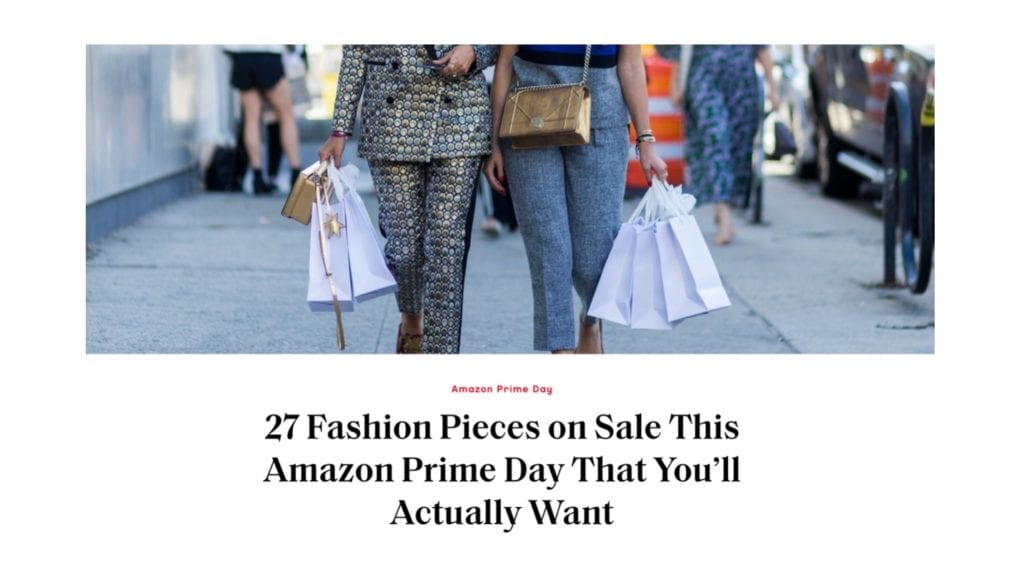The 20 Best Amazon Prime Day Fashion Deals of 2019. 27 Fashion Pieces on Sale This Amazon Prime Day That You’ll Actually Want. The Prime Day Fashion Deals We’re Obsessed With … These are some of the titles of the many articles published in connection Amazon’s Prime Day. From “the best buys in accessories” to “the top plus-size fashion deals,” the web was rife with articles promoting the 2-day shopping event, complete with prices, product descriptions, and shoppable links. The problem? At least some of these many articles were paid-for and not presented as such.
That is what Public Citizen asserts in a new letter this week addressed to the Federal Trade Commission (“FTC”), in which it is asking the government agency to investigate the presence of allegedly paid-for but undisclosed endorsements leading up to Prime Day. The Washington-based consumer rights organization identified more than a dozen articles and at least 75 Instagram posts that it says were not adequately flagged as paid promotions for Amazon’s annual Prime Day.
In the letter, which is signed by Public Citizen President Robert Weissman, the group claims that “some substantial portion of [the] publicity and recommendations for Amazon Prime Day” – from articles to Instagram posts – “were paid endorsements, but in a great number of cases, the endorsement relationship was either not disclosed to consumers or was communicated with inadequate disclosures.”
Despite Amazon’s policy of requiring its affiliates – individuals and businesses that earn money based on Amazon-specific sales they help facilitate – disclose such a connection to consumers, Public Citizen argues that the Seattle-based e-commerce titan is not enforcing such rules to ensure that disclosures are obvious to consumers or are included with any regularity. As such, the non-profit is calling on the FTC – which requires, as a result of its power under the FTC Act, that advertisers and influencers/media outlets, alike, include “clear and conspicuous” disclosures when an endorsement is the result of a “material connection,” such as an affiliate relationship – to step in.
This is not the first time that Public Citizen has petitioned the FTC to exert greater control over the influencer marketing sphere. In September 2016, the group, along with the Center for Digital Democracy, Commercial Alert and the Campaign for a Commercial-Free Childhood, sent a letter to the FTC, pointing to examples of advertisers and influencers failing to meet their obligations under federal law by not disclosing their connections.
In that letter, the organizations referred to a study by Public Citizen, which found 113 celebrities – ranging from musicians, actors and athletes to fashion industry influencers – who had endorsed products for pay and without valid disclosures to indicate such a relationship. The call to action prompted the FTC to send more than 90 letters to influencers and marketers in April 2017, alerting them to their duty to clearly disclose their relationships when promoting or endorsing products through social media.
As for the efficacy of the FTC’s initial letters, as well as a second round that followed in September 2017, advertising watchdog Truth in Advertising revealed in a study this spring, as well as a letter of its own addressed to the FTC, that more two years after the FTC sent its letters, 95 percent of the influencers, celebrities, and brands in question continue to operate in violation of federal endorsement guidelines. The Connecticut-based watchdog identified “more than 1,400 deceptive social media posts” – specifically from figures and brands that received letters from the FTC – that were “published between May 2017 and December 2018 promoting hundreds of brands” that lacked proper disclosures.
According to a statement from Amazon, “All associates must follow our Associates guidelines, which include obligations to identify as an associate and provide all legally required disclosures. Those who don’t are subject to action including potential closure of their account.”











